- Home
- Jim Fergus
Strongheart: The Lost Journals of May Dodd and Molly McGill Page 6
Strongheart: The Lost Journals of May Dodd and Molly McGill Read online
Page 6
Finally, we all agreed that it was best not to question the strange occurrences in the savage world, rather just accept them, which is how we have adapted to life among these people from the very beginning. One thing that is certain, the medicine woman did, indeed, save my life, when I knew without a doubt that I was dying. I wonder how she even managed to find me here? Was that, too, accomplished by supernatural means, or simply a refined sense of direction and an exact description of the location of the narrow entrance to the cave, given her by Quiet One, Feather on Head, and Pretty Walker? They would, certainly, have been required to provide the medicine woman with this information when Little Wolf sent her back to care for me. But how could they possibly have done so given this rocky, largely featureless landscape?
At the same time, was it magic or simply sound doctoring skills … acquired God knows how … by which she had drawn the bullet from my back, sealed the wound, and finally brought life back to my legs? Perhaps it was some combination of all these things. When I asked her, for instance, how she had avoided being discovered that first day in the cave when Brother Anthony crawled in through the opening, she said: “I went into the shadows, Mesoke, and I became a rock.” Was she speaking figuratively or literally, and, really, what does it matter? I have had, perhaps, far too much time to ponder such matters.
I realize that I still have a long way to go before I am able to walk. Wind, Háá’háese, as I have taken to calling her in the interest of brevity, continues to massage the muscles of my legs and flex my joints, and finally, one day she says: “Let us crawl out through the opening so that you may take some sunlight. After all this time in the dark, you will need to put a hand over your eyes at first.”
As weak as they feel, I am heartened to be able to use my legs a bit to help push my body as I crawl, and when I see the beam of light shining through the opening, I have the odd sensation of being a newborn baby leaving her mother’s womb, pushing out between her legs into this new world. Indeed, I need to cover my eyes for a moment in the face of the blinding sun. I pull myself up to a seated position in the dirt, and have a look around, as Wind follows me out the opening.
The landscape looks entirely different than I remembered it from that terrible morning when first we made our way here. I can see the tops of cottonwood trees down below in the river bottom; the leaves just breaking their buds, the meadows and plains stretching away to the horizon already beginning to green up, the promise of spring carried on a soft breeze. How beautiful this world is.
“Good God,” I whisper, “how long have I been in that cave?”
Woman Who Moves against the Wind raises both hands and begins opening and closing her fists, fingers flashing—ten, twenty, thirty, forty, and then she holds up her right hand with five fingers showing, and her left with three.
“Forty-eight days? So it must be sometime around mid-April.”
She does not know what the month of April is, but she easily interprets my astonishment. “You slept for a long time,” she says, nodding. And then with a sly smile, she adds, “You were very tired, Mesoke.”
And we share a good laugh at my expense under the soft spring sunshine. And that feels good, too, to laugh. I have been forgiven my unforgivable behavior.
“You must help me to stand, Wind,” I say. “I believe that I am ready to try.”
Supporting me under my arms, she lifts me to my feet, and without letting go, helps me to take my first uncertain babylike steps. Every day we walk like this, a little longer and farther each time, and soon I am able to get to my feet, and, with the aid of a stick, walk on my own.
Prior to finding the bows and arrows, and the dried buffalo meat, Wind had only her knife to rely upon for procuring our food. With that implement alone, she had somehow managed to stalk and kill the occasional deer, as well as killing small game such as rabbits and grouse with rocks. She told me that in hunting the deer, she had to approach close enough to be able to leap onto its back and stab its heart, which in itself struck me as a magic trick.
“You have to become invisible,” she explained of the stalk, “like a shadow cast by a passing cloud. And when the moment is right you leap like a cougar.” But now armed with the bow and arrows, her hunts are both more productive and considerably easier.
At the medicine woman’s urging, and after working hard to regain my strength, I have begun to join her in the hunt, first just tagging along as a spectator and trying not to get in the way. “We have no men to provide us with food, Mesoke,” she said, “or to protect us. And it will be some time, and a long way to travel, before we do. Now that you are stronger you, too, must learn to feed yourself and to defend against enemies in case we become separated, or something happens to me. You must become a hunter and a warrior.”
I had never shot a bow and arrow before, for hunting is not the work of women in the tribe, though you would hardly know that from Wind’s prowess. I, of course, was far less successful in my initial efforts, which were undertaken in the river bottom, where I aimed at and frequently entirely missed trees. But she is a patient instructor.
Wind has also given me the bone-handled knife she found in the village, that she cleaned and sharpened on a stone, and then set about teaching me how both to butcher an animal and to kill a man with it. “Unless they are wounded or feeble,” she said, “you know the men will almost always be stronger than you. And so you must be quicker and smarter than they. I will teach you how to kick them where it most hurts a man, how to wrestle, how to slip from their grasp like a slippery snake, and how to slit their throats before they do yours. And I will teach you how to scalp them and cut out their hearts.”
“If you don’t mind, I think I might prefer to skip that last part of the training,” I said. Yet Wind’s words bring to my mind our treatment by the wretches who kidnapped us last year, how our brave little Sara, rather than submit to the brute who was trying to violate her, pulled the man’s knife from the sheath at his waist and stabbed him in the neck. Still, he managed to kill her before he himself died atop her, and the rest of us were forced to submit to the unspeakable indignities of his compatriots.
I have spent my time among the People doing the endless work of women—digging roots, gathering firewood, hauling water, cooking, doing beadwork, looking after children, scraping and curing hides, stitching them together, breaking down and putting up tipis; I have been a dutiful wife, a mother-to-be, and, too briefly, a mother. But unless I am able to subsist on a diet of roots and wild legumes, I cannot feed myself, nor can I defend myself in physical combat. I need a man, or, in my present situation, Wind, to hunt for me, and to protect me. It occurs to me that this is the first time since I have been here in these plains that, but for my savior the medicine woman, I am alone and utterly defenseless.
“Yes, you are quite right, my friend,” I said. “We are two women, surrounded by enemies. I must know how to feed and protect you, as you have done for me. I am ready to learn all that you have to teach me, both as a hunter and as a warrior, including how to cut a man’s heart out with my knife, although I cannot imagine that will ever be a necessary act for me to perform.”
“If ever you come upon Jules Seminole again,” she said, “that is a skill you will wish to know, for it is the only manner in which he can be killed.”
“What do you mean by that, Wind? He is just a man, and, like any other, can be killed with a bullet, an arrow, a club, or a knife.”
“No, Mesoke, he cannot, for Jules Seminole is part man, part sorcerer; he moves between worlds spreading evil.”
I confess to laughing at her superstition. “I believe that if Seminole ever bothers me again,” I said, “Little Wolf will kill him. I am strong enough now. We must find our people.”
“You should know, Mesoke, that Little Wolf has surrendered to the Army and turned his band in at the Red Cloud Agency at Camp Robinson.”
“What?” I answered in astonishment. “But that is not possible. Little Wolf would never do such a thing.”
“Crazy Horse did not welcome him and his band to his winter village,” she explained. “As you know, the People left here after the attack with nothing, not even enough to cover ourselves from the cold. The chief sent me back to look after you, but the others traveled for over ten days to reach the Lakota. They had to kill and eat their few horses along the way, and they skinned them to use the raw hides to cover themselves. When finally they arrived, Crazy Horse shared very little with them. Those two great warriors have never been friendly, and Little Wolf was insulted by the Lakota’s lack of generosity. That is why he left and turned his band in at the agency. He did it because the People were starving, and were promised food and shelter there.”
“But how can you possibly know all this, Wind?” I asked. “For you have been here with me all this time, and never left my side except to hunt, and to scavenge in the village.”
“Before he left for the agency,” she answered, “Little Wolf sent a runner to tell me where he was going. He sent my sister because he knew she would be able to find us.”
“And why did I not see her when she came?”
“You were asleep much of the time, and she looks as I do. Sometimes when you woke, it was she who was rubbing your legs, or cleaning you.”
“Nonsense! How could she look so much like you that I would not know the difference?”
“She is my other half, my twin, you say, like your redheaded girls.”
“I never knew you had a twin,” I said. “I never saw her in our village. What is her name?”
“Woman Who Moves against the Wind.”
I laughed. “You mean to say that you both have the same name?”
“You saw her in the village, you just thought she was me. We are not often seen together. Some of the people believe that we are one person who has the ability to be in two places at the same time. Others believe that each of us is half of one person, and both of those things are true. We live in separate bodies but we always know what the other is thinking. Little Wolf never asks which of us is which. He does not care. We advise him equally.”
“I have heard some crazy things since I’ve been among the People, Wind,” I said. “But that is one of the craziest yet.”
“But it is true.”
“Yet that makes you a charlatan, pretending to be something that you are not.”
“We do not pretend,” she said. “We do not control what other people believe. And all medicine works best when people believe in it.”
“Yet I didn’t believe in it,” I pointed out, “and it worked for me, as well.”
“You believed enough, Mesoke. You just didn’t know it.”
“Why didn’t you tell me sooner that your sister had been here?”
“There was no reason to, and I did not believe you were strong enough to hear news that might upset you.”
“And what news would that be?” I asked. “Your sister told you about my friends, didn’t she, about the other white women?”
She nodded.
“And why do you keep this from me now? Tell me. Tell me everything.”
“The redhead sisters, Heståhkhá’e, Twin Woman you remember we call them, for they, too, are thought to be two halves of one person. They both survived the attack and the journey to Crazy Horse’s village, but they lost their babies to the cold on the way. Your holy man, Anthony, also reached the Lakota camp alive.”
“And who else?” I asked, as the tears began to well up behind my eyes. “That can’t be all.”
She nodded. “I am sorry, Mesoke.”
“Good God!” And I began to weep. “All the others, gone?… my friends Helen, Phemie, Daisy, Gretchen? And their babies? All dead? But this cannot be. It has helped to keep me alive in the darkest times, believing that we might one day be reunited.”
“It is for this reason that I have not told you sooner, Mesoke. But now you are strong enough to bear this news.”
“Do you know how my friends died?” I asked through my tears. “If you do, you must tell me.”
“Mo’ohtaeve’ho’a’e, Black White Woman, and the artist, Medicine Bird Woman, Ve’kkesohma’heonevestsee, died defending the village when the soldiers attacked. They stayed to fight with the warriors to protect the women, children, and the old as we ran into the hills. They were both killed by the soldiers. Gretchen and her baby were shot as she fled with the others. The woman, Daisy, and her baby died of the cold on that first night.”
“God help them,” I said, weeping. “God help them…” It took me some time to collect myself again, and when I did, I asked Wind: “And where are Meggie, Susie, and Brother Anthony now? Thank God that at least they, and Martha and her daughter survived.”
“Your holy man left with Little Wolf’s band to go to Red Cloud Agency,” she answered. “He wished to find your friend, Falls Down Woman and her child, whom he had left in the care of the Army captain after the attack. The two sisters stayed in Crazy Horse’s village. They did not wish to surrender. They knew they would be sent back where they came from. They wished to go on the warpath against the soldiers to avenge the death of their babies. Now, as you say, you and I must leave here soon. We must find our people.”
“But we cannot go into the agency, Wind, for the soldiers will detain me there, and send me back to the lunatic asylum.”
“Yes, I know,” she said, nodding.
“Then where do we go?”
“There were some among Little Wolf’s band who refused to surrender,” she said. “Some who had relatives in the Lakota camp stayed there. And then they, too, left, led by the young warrior Hawk, whose father was Lakota. Do you remember him?”
“Yes, I do, he of the fair hair,” I answered, “whose mother is the white Cheyenne you call Heóvá’é’ke, Yellow Hair Woman. She, who has never been friendly with us, and refused even to speak English. Hawk is married to a pretty girl named Amé’ha’e, Flying Woman, and they have a young daughter, whom they call Mónevàta, Youngbird. Indeed, I remember them well because our friend Helen Flight was so charmed by their names. I can just hear her: ‘Smashing, isn’t it? An entire family of avians!’” And I began to weep again as Helen’s words spilled from my mouth.
“Yes, Mesoke. My sister told me that Hawk’s mother, wife, and son were all killed in the attack on our village that morning. The soldiers fired low into their tipi, killing them before they had time to rise from their sleeping places. Hawk, too, wished to go back on the warpath, to avenge the death of his family. It is with Hawk and his band that the red-haired sisters are now traveling. And I must tell you one other thing, Mesoke, that I learned from my sister.”
“If it is more bad news about my friends, Wind,” I said, “I do not think I can bear to hear it just now.”
“This is not such bad news, Mesoke, and it is not about your friends. When Little Wolf and our people arrived in the village of Crazy Horse, they learned that the Lakota warriors, led by our Hawk, had captured another group of white women off a train. They were sent by your government and were making their way to the People as more brides for our warriors.”
“Oh for God’s sake, you cannot be serious. Isn’t that just what is needed in these times of carnage, more white women as cannon fodder for the soldiers. And where are they now, these women?”
“The twin red-haired girls were charged with looking after them, and they, too, are now traveling with Hawk.”
“And you suggest we try to find them?”
“We must find them, Mesoke,” she said, “or another band of the people to join. We are not safe traveling alone.”
“But what about my daughter? How will I ever get back to Little Bird if she, too, has been taken into the agency?”
“You will have your Ve’keseheso back again, Mesoke,” she assured me, “but not yet.”
“How do you know that, Wind?”
“I have seen it.”
THE LOST JOURNALS OF MOLLY McGILL
Wolves for the Blue Soldiers
The c
ommanding general (George Crook) assembled all his Indians (scouts) and laid down to them in a few well-chosen words, rules for their guidance during the campaign. He emphasized the fact that all these vast plains, all these mountains and valleys would soon be filled with an aggressive, hard-working population, the game would be exterminated, domestic cattle would take its place, and the Indian must make up his mind, and make it up now, to live like the white man and at peace with him, or be wiped off the face of the earth. They were going to get good pay as soldiers, as long as they behaved themselves … but they must not spend their pay foolishly. Save every cent and buy cows and mares. While the Indian was sleeping the calves and colts would be growing and someday he’d wake up and find himself a very rich man.
—from Mackenzie’s Last Fight with the Cheyennes: A Winter Campaign in Wyoming and Montana by Captain John G. Bourke, U.S.A.
3 July 1876
I did not unfold the page torn from May Dodd’s journal until we had traveled for several days. But when I did, and read it, it took me back to the cold, dark cave where May was said to have died, and where Martha had led us that day in the rocky hills above their destroyed village. I was not surprised that Meggie and Susie thought perhaps May was hallucinating when she wrote this, dreaming perhaps of being saved by the medicine woman at the end of her life.
As to Brother Anthony, though our group did not have the chance to get to know him well, he seemed an earnest, devout man who, by all accounts of Meggie and Susie, cared well for his flock of white women … as well as he could, at least under impossible circumstances. It does seem nearly impossible that he would have been so careless as to mistake May for dead if she still lived.
I wonder, too, why the Kellys had withheld this information from the others. All I can imagine is that after Meggie folded the unread page and put it away in her medicine bag that day in the cave, in the face of ensuing events, she forgot all about it. I must admit that until I opened Meggie’s medicine bag, I, who discovered the page in the first place, had forgotten its existence myself. We simply had too many immediate concerns of our own to face. I’m guessing now that Meggie and Susie didn’t read it until shortly before they wrote their letter to me. If May really is still alive, it is impossible to guess in these fractured, desperate times where she might be, or what fate may have befallen her.

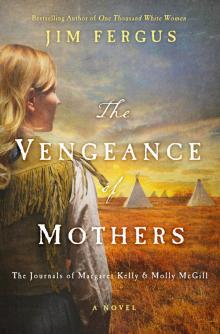 La Vengeance des mères
La Vengeance des mères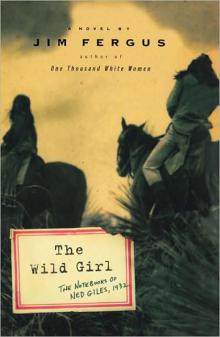 The Wild Girl: The Notebooks of Ned Giles, 1932
The Wild Girl: The Notebooks of Ned Giles, 1932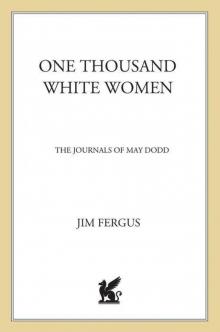 One Thousand White Women
One Thousand White Women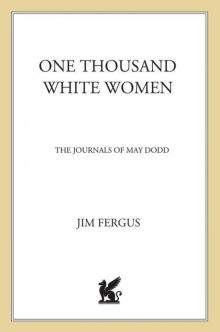 One Thousand White Women: The Journals of May Dodd
One Thousand White Women: The Journals of May Dodd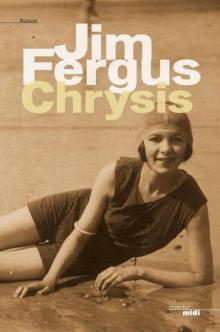 Chrysis
Chrysis Strongheart: The Lost Journals of May Dodd and Molly McGill
Strongheart: The Lost Journals of May Dodd and Molly McGill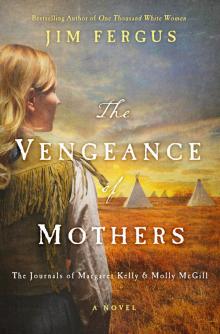 The Vengeance of Mothers
The Vengeance of Mothers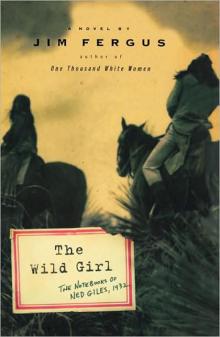 The Wild Girl
The Wild Girl